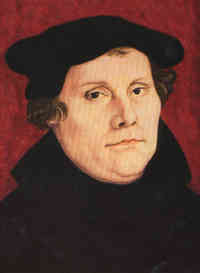De Servo Arbitrio “On the Enslaved Will” or The Bondage of Will
by Martin Luther
Summary
In the September of 1524, Erasmus of Rotterdam, a prominent Catholic scholar of the
Reformation Era, published his first attack on Martin Luther's theology. While Erasmus
argued for the free will of human beings, Luther argued that humans' sinful nature
rendered them slaves to wickedness, free only to sin unless by the intervention of God's
sovereign grace. This treatise, which contains Luther's reply to Erasmus, constitutes one
side of one of the first and most important debates that emerged during the Reformation,
namely, that concerning free will and predestination. Later in his life, Luther would
regard De Servo Arbitrio as one of his best works; by contrast, he was loath to recognize
some of his other early works as belonging to him at all.
Kathleen O'Bannon
CCEL Staff
Kathleen O'Bannon
CCEL Staff
Popularity
Available formats

